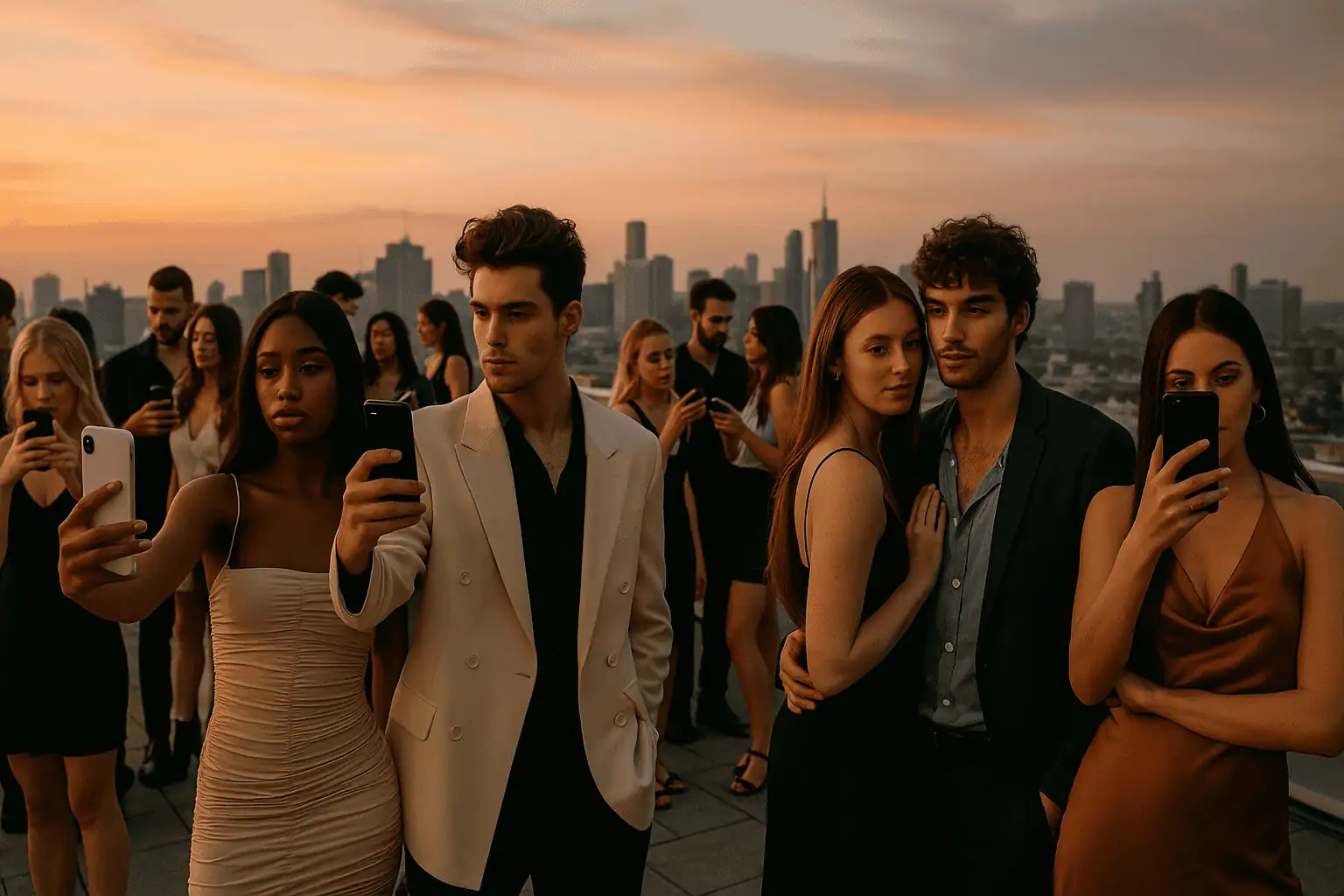
Throning: Why Gen Z Is Dating for Status
Ever heard of “throning”? It’s the heartbreaking new dating trend that has many older folks asking: Has social media ruined romance for Gen Z? In a world where everything feels like a status update, some young people seem to treat love as a means to an end. This new dating trend involves dating someone not for love or companionship, but for clout and social status. Essentially, they’re dating people for what the partner represents, not for who they are. The term itself – throning – pretty much spells out the idea, and it’s leaving a lot of us (especially those who grew up pre-Instagram) shaking our heads.
What Is Throning and How Is It Different from Gold-Digging?
Simply put, throning involves dating someone for their status or influence rather than genuine affection. Think of it as “dating up” on steroids. It’s the latest dating trend making waves among Gen Z, though the behavior behind it isn’t entirely new. Unlike old-school gold digging – chasing a wealthy partner for financial gain – throning is more about social clout than money. It’s about being seen with the “it” person who can elevate your image. Historically, this echoes hypergamy, the practice of “marrying up” in social rank. Men have frequently accused women of this for ages, painting women as the usual status-seekers. But in the world of throning, it isn’t one-sided or limited by gender. Zoomers are turning relationships into strategic alliances for attention and fame.
In a throning relationship dynamic, one partner essentially treats the other as a trophy – a living status symbol. Being with that person confers bragging rights and boosts your reputation. It might be their looks, wealth, or social influence (like a huge follower count) that makes them attractive as a partner — dating a TikTok star or Instagram model can grant instant clout. In these cases, love or compatibility isn’t the priority; boosting one’s own image and ego is. That’s why observers say this throning trend is dating for all the wrong reasons. It’s less about finding a soulmate and more about orchestrating a “power couple” image to show off.

How Social Media Culture Fuels Throning
Throning didn’t emerge in a vacuum – the rise of social media has played a huge part. In the age of Instagram, TikTok, and endless online discussions, image is everything. Young people today are essentially curators of their lives. They’re carefully curating relationships much like they curate content, making sure every photo-op boosts their personal brand. Modern romance has a big social media element: it’s not just about how your partner makes you feel, but how they make you look to everyone else. Dating has, in a sense, turned into a public performance. From cute couple selfies to lavish “date night” posts, there’s constant pressure to present an enviable life online.
This ever-present audience has shifted priorities. Instead of private moments and genuine bonding, a throner is often busy thinking, “How will this look on my feed?” The focus skews toward public approval over personal connection. If a partner can boost your likes, follows, or status in your social circle, they become more desirable. Being seen as a “power couple” becomes a badge of honor. In this social media culture, the optics of a relationship can sometimes matter more than the reality. Digital validation is, for some, turning love into a status game.
Why Gen Z Dates for Status: The Lure of Clout and Validation
What drives someone to throne? Often, a mix of ambition and desire for applause – essentially, social capital and external validation. In plain terms, clout. For some Gen Zers, dating becomes another way to climb the social ladder or boost their social status. They target partners with impressive looks, followers, or connections because that offers an immediate boost to their own popularity. Being on the arm of a high-status person can open doors – from exclusive events to new followers – giving the throner a quick social boost. It’s not unlike clout chasing, where people do wild things for attention; except here the “wild” move is treating a relationship as a networking tool.
Many young people also grew up in an era of likes and comments, so it’s no surprise that some crave validation in their love lives too. If everyone online is fawning over your enviable partnership, it can feel flattering (if shallow). There’s also the appeal of influence by association – dating someone admired or famous can make you feel more important by proxy. In the age of influencers, who you date can even bump up your own follower count. All these factors tempt some into pursuing relationships solely for the status payoff. But it’s a risky gamble – basically playing games with your heart – and meaningful connection often gets lost. Love starts to feel transactional, more like networking than romance.
Dating Apps and the “Dating Up” Mentality
Swipe-based dating apps have poured fuel on this fire. With endless options at their fingertips, everyone is shopping for the “best” partner they can find. According to research published in the journal Science Advances, people on these platforms tend to pursue matches about 25% “more desirable” than themselves on average. In other words, many are dating people they think rank higher than them – a hallmark of this status-seeking mindset. It’s hypergamy gone digital.
And it’s not just women chasing rich guys anymore – now everyone’s trying to “date up” if they can. The result? A sense that there’s always someone better around the corner. You might swipe past a perfectly decent match because you hope the next profile will be someone even more impressive. In fact, having plenty of choices can backfire: the more options people have, the more they skip over potentially great partners in search of an ideal.
Interestingly, many young adults today don’t need to “marry up” for financial security – plenty of women earn as much as men – yet the pull of status persists. Throning is like hypergamy updated for 2025: not about money or survival, but about ego and visibility.
Emotional Consequences: Superficial Bonds and Real Heartbreak
On the surface, throning might seem harmless – who wouldn’t enjoy a partner that makes them look good? But scratch deeper, and the pitfalls appear. Relationships built on status tend to be, well, shallow. Without true trust or compatibility, there’s no real emotional connection holding things together. Both parties can end up unfulfilled: one feels objectified (reduced to a status booster), and the other never gets the comfort of being loved for who they are instead of what they represent.
When your bond becomes a performance, emotional intimacy suffers. Sure, your photos together at the gala look amazing, but if there’s no honest communication or support behind the scenes, that’s a problem. Often, the “throned” partner notices their significant other is overly focused on taking selfies at fancy locations rather than enjoying genuine quality time. This dynamic can quickly lead to heartbreak. Imagine realizing your partner invited you to that black-tie event not because they value your company, but because you make them look successful – that’s a punch to the gut.
And for the person doing the throning, there’s an emptiness in never letting your guard down. They may bask in the glow of public envy but miss out on true companionship – and when the spotlight moves on, they’re left feeling lonely. There’s also an inherent instability in status-driven relationships. If your partnership is built on keeping up appearances, what happens when a shinier person comes along? A throner might drop their current partner the moment a higher-status option appears. Breakups in these cases can be especially cold and sudden: one day you’re the prized “king” or “queen” at their side; the next, you’re replaced without ceremony. It’s no wonder some older folks look at this and mutter that social media ruined romance.

Navigating Throning: Expert Advice and Final Thoughts
Relationship experts and dating coaches are largely waving red flags about throning. Dating coach Amy Chan advises that if you find yourself dating for status, take a hard look at why. Using romance as a ladder for your ego is a recipe for disappointment. And remember: not everyone proclaiming they want a “king” or “queen” has good intentions. Stay mindful of someone’s intentions when navigating the modern dating scene.
If you suspect you’re being “throned” – say, a date seems more interested in your job title or follower count than in actually knowing you – trust your gut. That’s a red flag, and you deserve better than being someone’s accessory. At the end of the day, relationships rooted in authenticity will always outshine hollow status plays. Plenty of Gen Z daters still prioritize real love over clout. True connection beats temporary social media fame every time. After all, when dating becomes more about looking good than feeling good, everybody loses in the end.
At Jack and Jill Adult, we believe genuine connection should never take a backseat to clout. Real intimacy comes from chemistry, not followers. Plenty of Gen Z daters still prioritize real love over image, and that’s a trend worth celebrating. True connection beats temporary social media fame every time — because when dating becomes more about looking good than feeling good, everybody loses in the end.

